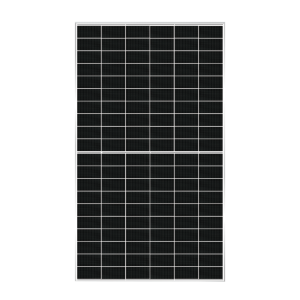Módulos solares com células HJT monocristalinas cortadas pela metade: o futuro da energia solar
Hora de lançamento: 2024-11-15
À medida que o mundo muda para soluções de energia sustentáveis, a energia solar continua sendo uma das fontes mais promissoras de energia limpa. Entre as tecnologias de ponta que revolucionam a indústria solar estão Células HJT monocristalinas cortadas pela metade, que fornecem eficiência, longevidade e desempenho superiores do módulo solar. Neste guia, exploraremos os benefícios, aplicações e o futuro desta tecnologia solar de alto desempenho.
O que são células HJT monocristalinas de corte médio?
Para apreciar plenamente os benefícios de Módulos solares HJT monocristalinos de corte médio, é importante primeiro entender os principais componentes por trás dessa tecnologia:
- Células solares monocristalinas: Conhecido por sua alta pureza, o silício monocristalino fornece melhor eficiência solar e desempenho em comparação com células policristalinas ou de película fina. Essas células maximizam a saída de energia e funcionam efetivamente em condições de pouca luz.
- Tecnologia de Heterojunção (HJT): A tecnologia HJT combina silício cristalino e silício amorfo, criando células solares de alta eficiência. Essa estrutura sanduíche reduz perdas de energia e aumenta o desempenho, especialmente em climas quentes ou luz solar direta.
- Tecnologia de célula meio cortada: Os painéis solares tradicionais usam células de tamanho normal, mas as células Half-Cut dividem cada célula ao meio. Isso reduz perdas por sombreamento, aumenta a durabilidade do painel solar e resulta em maior produção geral de energia.
Quando combinadas, as células HJT monocristalinas Half-Cut fornecem módulos solares de alto desempenho, ideais para instalações solares residenciais, comerciais e de grande porte.
Principais vantagens dos módulos solares HJT monocristalinos de meio corte
- Maior eficiência
Módulos solares HJT monocristalinos de corte médio oferecem uma das maiores eficiências de células solares do mercado. Com tecnologia monocristalina e o design avançado HJT, esses painéis são altamente eficientes na conversão de luz solar em eletricidade, mesmo em condições de pouca luz. Isso os torna ideais para locais com exposição solar limitada.
- Maior durabilidade e longevidade
O design de meio corte reduz o estresse mecânico nas células solares, melhorando sua durabilidade. Os painéis solares HJT são menos propensos a danos por sombreamento e altas temperaturas, o que estende sua vida útil — geralmente até 30 anos ou mais.
- Desempenho aprimorado em sombreamento parcial
Uma das maiores desvantagens dos painéis solares tradicionais é a perda de sombreamento, que pode reduzir drasticamente o desempenho. Os módulos solares Half-Cut HJT são menos afetados por sombreamento parcial devido aos seus segmentos menores, o que significa maior rendimento de energia mesmo em áreas com obstruções como árvores, chaminés ou edifícios próximos.
- Coeficiente de temperatura mais baixo
A tecnologia HJT ajuda a reduzir o coeficiente de temperatura, o que significa que esses painéis mantêm a eficiência em altas temperaturas. Isso é especialmente benéfico em climas mais quentes, onde outros painéis solares podem ter desempenho inferior devido ao calor excessivo.
- Custo-eficácia ao longo do tempo
Embora o custo inicial dos módulos solares HJT monocristalinos Half-Cut possa ser mais alto, a economia a longo prazo com menores custos de manutenção, melhor desempenho e maior vida útil os tornam um excelente investimento para sistemas solares residenciais, comerciais e industriais.
Aplicações de módulos solares HJT monocristalinos de meio corte
- Instalações solares residenciais
Proprietários de imóveis que buscam reduzir custos de energia e minimizar sua pegada de carbono acharão os Painéis Solares HJT Mono Cristalinos Half-Cut ideais para seus telhados. Graças ao seu design compacto e alta potência de saída, até mesmo um espaço limitado no telhado pode gerar quantidades significativas de eletricidade.
- Aplicações comerciais e industriais
Empresas e propriedades comerciais podem aproveitar os Painéis Solares Half-Cut HJT para instalações solares de larga escala. Esses painéis são perfeitos para sistemas solares de telhado, estacionamentos ou outros espaços comerciais onde a produção eficiente de energia e custos operacionais reduzidos são prioridades.
- Fazendas solares em escala de utilidade pública
Usinas de energia solar em escala de utilidade pública se beneficiam dos módulos solares HJT monocristalinos Half-Cut devido à sua confiabilidade e alta produção de energia. Esses sistemas têm bom desempenho em vários climas e reduzem os custos de manutenção ao longo do tempo, tornando-os perfeitos para projetos solares de larga escala.
Como escolher os módulos solares HJT monocristalinos de meio corte corretos
Ao selecionar módulos solares para sua casa ou empresa, tenha estes fatores em mente:
- Eficiência: Escolha painéis com classificações de eficiência mais altas para garantir que você esteja maximizando sua produção de energia, especialmente se o espaço for limitado.
- Garantia e confiabilidade: Procure módulos com garantias longas (mais de 25 anos) e um histórico comprovado de desempenho confiável.
- Desempenho de sombreamento e temperatura: Selecione painéis que tenham baixo coeficiente de temperatura e sejam menos afetados pelo sombreamento.
- Reputação da marca: Escolha marcas confiáveis, conhecidas por produzir painéis solares HJT de alta qualidade, com excelente suporte ao cliente e garantias de desempenho de longo prazo.
O Futuro da Energia Solar
A ascensão dos módulos solares HJT monocristalinos Half-Cut faz parte de uma tendência mais ampla em direção a tecnologias solares cada vez mais eficientes e duráveis. À medida que a eficiência das células solares continua a melhorar, a acessibilidade e a acessibilidade da energia solar se expandirão. No futuro, espere inovações em armazenamento de energia, integração de rede inteligente e maior adoção solar em todo o mundo.
Esses avanços ajudarão a reduzir a dependência global de combustíveis fósseis e contribuirão para um futuro energético mais limpo e sustentável.
Conclusão
Módulos solares HJT monocristalinos de corte médio representam um salto à frente na tecnologia solar, oferecendo eficiência, durabilidade e custo-benefício inigualáveis. Seja você um proprietário de casa, empresário ou parte de um projeto de utilidade pública de larga escala, esses painéis solares são a escolha ideal para maximizar a produção de energia e economias de longo prazo.
À medida que o mundo adota a energia renovável, os módulos solares Half-Cut HJT serão essenciais para impulsionar a adoção da energia solar, tornando a energia solar mais eficiente, acessível e acessível do que nunca.






